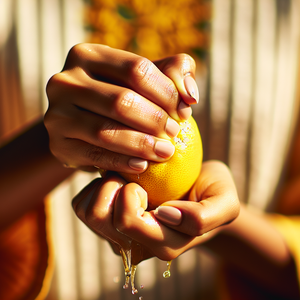The Zen of Shiny Surfaces: A Doorknob Polisher's Guide to Mindfulness

At first glance, polishing doorknobs may seem like an absurdly trivial activity. Most of us barely notice these small, functional objects we touch every day, let alone consider their symbolic significance. However, to the doorknob polisher, these fixtures are far more than entry points into physical spaces—they are metaphors for life's transitions and opportunities. By polishing a doorknob, the polisher imbues these moments of transition with intention and care. The process of wiping, scrubbing, and buffing becomes a ritual of transformation, elevating the humble doorknob into an emblem of mindfulness. “Every doorknob tells a story,” says the doorknob polisher. “Some are scratched and tarnished, while others gleam with barely a blemish. But each one, no matter its state, deserves attention.” This act of deliberate care mirrors the principles of mindfulness, which encourage us to focus on the present moment without judgment. The physical movements of polishing—a slow, circular rhythm—become a moving meditation, anchoring the polisher in the here and now.
The Science of Repetition and Mental Clarity
The therapeutic benefits of repetitive tasks have been well-documented by psychologists and mindfulness practitioners alike. Activities like knitting, painting, or even scrubbing floors can induce a sense of calm, providing a much-needed respite from the chaos of modern life. Polishing doorknobs fits naturally into this category, offering an unconventional yet effective way to unplug and recharge. For the doorknob polisher, the ritual is not about achieving perfect results. Scratches and imperfections are part of the doorknob’s character, much like the flaws we encounter in our own lives. “Polishing isn’t about erasing imperfections,” the polisher explains. “It’s about embracing them, working with them, and learning to appreciate the beauty they bring.” This philosophy resonates deeply with mindfulness teachings, which emphasize acceptance and non-judgment. Rather than striving for unattainable perfection, the doorknob polisher finds peace in the process—a lesson we could all benefit from in our hypercritical, results-driven culture.
A Modern Solution to Everyday Stress
In a society dominated by screens, deadlines, and relentless demands for productivity, stress has become an almost universal affliction. While many turn to guided meditations or wellness apps in search of balance, these tools don’t resonate with everyone. Some find it difficult to sit still and focus on their breath, while others feel disconnected from traditional mindfulness practices. This is where the doorknob polisher’s approach shines. By integrating mindfulness into an everyday task, they demonstrate that peace can be found in the simplest moments. You don’t need a retreat or special equipment to cultivate mindfulness—sometimes, all it takes is a cloth, some polish, and a doorknob. Scientific studies on “flow states” support this notion. When we fully immerse ourselves in an activity—whether it’s cooking, gardening, or polishing—we enter a state of deep focus that quiets the mind and fosters a sense of fulfillment. For the doorknob polisher, this flow state is both the means and the end.
How to Incorporate Mindful Polishing Into Your Life
Although few of us are likely to devote our lives to polishing doorknobs, the principles behind this practice can easily be adapted to suit our own routines. Here are some practical suggestions to get started: 1. Pick a Simple, Repetitive Task: Identify a task that doesn’t require intense concentration but allows for physical engagement—things like sweeping the floor, dusting shelves, or organizing a drawer. 2. Be Present in the Process: Focus on the sensations of the task. Notice the texture of the materials, the rhythm of your movements, and the changes you create. 3. Release the Need for Perfection: Don’t worry about achieving a flawless result. Instead, embrace the imperfections and view them as a natural part of the experience. 4. Reflect on the Experience: After completing the task, take a moment to observe your mental state. Do you feel calmer or more centered? Use this as a reminder of the value of slowing down.
The doorknob polisher embodies a profound truth: that even the humblest of tasks can hold the potential for mindfulness and meaning. By dedicating themselves to polishing, they offer a compelling reminder that peace often lies not in grand gestures but in the quiet, deliberate acts of care we bring to the world around us. In a society that constantly urges us to do more, achieve more, and be more, the doorknob polisher’s practice offers a liberating alternative. Through their work, they encourage us to slow down, appreciate the present moment, and find beauty in the ordinary. So the next time you reach for a doorknob, pause for a moment. Run your fingers across its surface. Consider the transitions it represents, and perhaps even take a moment to give it a little extra shine. Who knows? You might just discover a touch of Zen in the process.
Surface Restoration Specialist
Restoration firms, luxury hotels, or museums preserving heritage properties
Core Responsibilities and Skills
Restore and polish metal, wood, or stone surfaces to their original condition, often in historic buildings or high-end properties.
Utilize advanced techniques such as buffing, sanding, and chemical treatments to achieve flawless finishes.
Collaborate with clients to preserve the aesthetic and functional value of architectural elements.
Unique Skill: Expertise in working with rare materials like antique brass or marble is highly valued.
Mindfulness Coach (Specialized in Physical Practices)
Wellness centers, corporate wellness programs, or independent coaching businesses
Core Responsibilities and Skills
Design and lead mindfulness workshops that integrate repetitive tasks like cleaning, organizing, or crafting into meditative practices.
Teach participants how to focus on the present moment through physical engagement with their environment.
Create custom mindfulness plans for individuals or corporate wellness programs.
Unique Skill: Experience in blending mindfulness with hands-on activities, such as pottery or woodworking, is a plus.
Luxury Detailing Specialist
Luxury car dealerships, private clients, or detailing companies specializing in premium services
Core Responsibilities and Skills
Provide meticulous cleaning and polishing services for high-value items such as luxury cars, yachts, or fine jewelry.
Use specialized tools and techniques to achieve a flawless finish while preserving delicate materials.
Stay updated on the latest industry products and procedures for maintaining quality.
Unique Skill: Knowledge of high-end brands and materials (e.g., Alcantara, platinum, or exotic leathers) is often required.
Craftsmanship Trainer
Trade schools, community centers, or independent crafting studios
Core Responsibilities and Skills
Teach aspiring artisans the principles of precision, patience, and quality in craftsmanship, such as metalworking, woodworking, or ceramics.
Develop training programs that emphasize the importance of detail-oriented work and mindful practices.
Mentor students to cultivate a deep appreciation for their craft and its impact on daily life.
Unique Skill: Ability to incorporate mindfulness philosophies into technical training is highly sought after.
Artisan Metal Polisher
High-end design firms, custom fabrication shops, or self-employment as an artisan
Core Responsibilities and Skills
Specialize in polishing and finishing custom metal pieces, such as bespoke furniture, sculptures, or architectural fixtures.
Collaborate with designers and fabricators to ensure the final product meets both aesthetic and functional standards.
Maintain a deep understanding of metal properties, including oxidation and patina, to create desired finishes.
Unique Skill: Expertise in creating decorative finishes, such as mirror-polished stainless steel or brushed brass, is highly valued.


